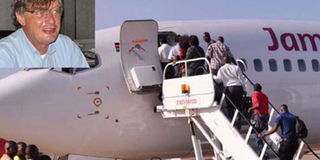Cost of air tickets must be affordable, says airline boss

Willem Hondius, the Jambojet chief executive officer explains a point during the interview. PHOTO BY ERONIE KAMUKAMA
What you need to know:
With the cost of airline travel almost out of reach for most Ugandans, it is relieving to see that Ugandan now have a low budget airline. Eronie Kamukama had a chat with Willem Hondius, the Jambo Jet chief executive officer to understand how the airline operates and it plans to change Ugandan skylines.
What is all this buzz about Jambojet? Have you just started or you have been around?
We started four years ago. We are a fully owned subsidiary of Kenya Airways. We started with three domestic destinations and after four years, we decided to write to governments in East Africa to open up routes within the region.
In Uganda we started in February, fly twice a day and so far we have had some good growth and reception.
Uganda seems to be a crowded market? Why do you think you needed to come here?
Uganda is an important market if you look at passengers flying within the region, especially in regard to traffic between Nairobi and Entebbe.
Secondly, is you look at Uganda and Kenya, there is a lot of trade between the two countries. Therefore, we thought this was one of the routes that we need to tap into.
How do you plan to make a return on investment?
Our main aim is to keep fares as low as possible in order to stimulate the market to persuade people into using air transport as opposed to other means. When we started in Kenya, 35 per cent of our passengers were people who had never flown on an airplane.
We are experiencing the same. Ours is a new model but people are responding well.
However, you should note that when you start to fly international routes, you are subjected to charges and taxes that are sometimes high.
For instance, if you fly from here to Nairobi, you have to pay $58 (Shs214,000) to the airport and if you fly from Nairobi to Entebbe, you pay $50 (Shs184,000).
So even with our low fares, due to these high airport taxes, those taxes make it more expensive than we would have wanted it to be.
Many airlines have failed in this market and others are struggling on? What makes you think you will succeed?
We operate a different model which automatically takeaway from directly competition with established airlines.
Ours is a completely different segment that seeks to offer air travel services at affordable rates.
That is why I am confident that we will survive in this market. The struggle is that people have to get used to our type of products.
What are the challenges of trying to get the right pricing for a route like Nairobi-Kampala?
You have to factor in your costs and see how you can create a sustainable business.
If you look at Africa, Kenya and Uganda in particular, it is a bit more expensive in a lot of things than Europe or US.
There are a lot of monopolies in Africa and they determine prices as they see fit. Competition is still low and operating a business becomes difficult.
Secondly, the population in most of African countries, particularly in Uganda is big but only a small portion of them is able to fly unlike about 78 per cent of people in Europe who are able to fly.
At the same time, there is a lot of competition in Europe yet in Africa you see so little of that. All these factors make it difficult to have an affordable and sustainable pricing model.
Are trying to shore up the bottom line of Kenya Airways?
Kenya Airways is serving another type of people. Our target is to serve a section of other people who cannot afford to fly in high budget airlines.
Such people include small business owners, among others.
Do you think there is room for growth in Uganda’s aviation sector?
Yes, if you look at the development trajectory in Africa, the middle class is growing.
Of course it will take time but there are indications and prospects that it is growing.
Does Uganda’s policy aspect support this growth (in aviation sector)?
There challenges but these can be discussed. The government and those others in the region must lower the airport taxes because they very much factor into the price of an air ticket.
On the other hand, handling fees are quite high and there are a lot of other things that airlines have to bear with to survive, which eventually feeds into the cost of cost and growth.
For me, it is always a target to see where we can lower our costs and also stimulate other parts of the government to lower the cost for airlines.
My hope is to succeed here as it has a multiplier effect on both Uganda and the Kenyan economy.
Flying must become cheap. We have seen it in Europe and Asia and I believe we can achieve it.




